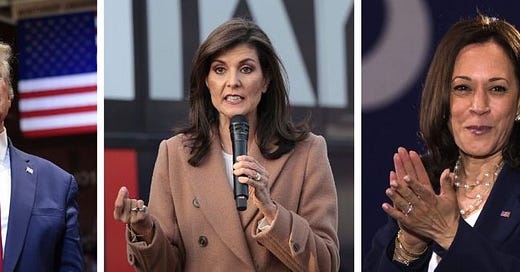The Ongoing Relevance of Electoral Reform
Whatever the outcome of this year's presidential election, there will be the continuing need to adopt major structural reform of the nation's electoral system.
Over at the Election Law Blog, Rick Hasen offered some final thoughts heading into Tuesday’s election. He expressed the hope that our field of election law will be irrelevant by the week’s end. I share his hope with respect to one portion of our field: the portion that concerns “Counting Votes and Declaring Winners.” As Rick said, if the result is decisive enough, the details of the legal procedures for resolving disputed outcomes won’t matter—and this is true even if the losing candidate refuses to accept defeat, as happened in 2020.
There is another portion of election law, however, that will remain very relevant regardless of the result on Tuesday. Given the work I’ve been doing since 2021 on reforming the electoral system to counteract polarization and extremism (some of which I’ve been doing with Larry Diamond, Rick Pildes and others, leading to a co-edited book to be released next month), I’m confident that whichever candidate wins, and whatever the margin of victory, there will be significant calls to reform America’s electoral methods, and those of us in the field of election law should devote our attention to these efforts.
Most obviously, if there is another divergence between the winner of the Electoral College and the candidate who receives a majority, or even a plurality, of the national popular vote, then there will be renewed efforts to replace the Electoral College or attempt to bypass it through the National Popular Vote Interstate Compact.
Even if there isn’t this kind of divergence, there will be (and should be) considerable interest in electoral system reform. As Rick Pildes observed in his recent NY Times opinion essay (which I echoed and amplified previously on Common Ground Democracy), there is an unusually large number of electoral reform initiatives on the ballot in multiple states this year. Although these reforms do not directly affect presidential elections because of the uniqueness of the Electoral College system, their underlying principles are most certainly relevant to presidential elections as well.
No matter what the outcome of this year’s presidential election, both in terms of which major-party candidate ends up the winner and how close (or not) the gap in votes received by these two candidates, the result is unlikely to reflect what would have been the outcome if on Tuesday a majority of the American electorate had been able to vote for its most preferred candidate in this year’s race. Nikki Haley never made it to Tuesday’s ballot because of the existing electoral system, in which partisan primaries often block the candidate who would be most preferred in the general election. There is little doubt if the vote on Tuesday were Haley versus Harris, instead of Trump versus Harris, the nature of the race and speculation about its outcome would be very different from what is now. And we can be certain that the American electorate as a whole—Democrats, Republicans, and independents combined—would far prefer Haley to be president than Trump. The point here, in technical terms, is that Haley might well have been the “Condorcet Winner” in a Top-Three electoral system using a Condorcet-based voting procedure—although we can’t know for sure; there’s a chance Harris would have been the Condorcet Winner instead of Haley. (There’s no chance Trump would have been the Condorcet Winner.)
For anyone concerned about the protection and future of American democracy, it should be very sobering that the nation is in its current situation because it has an electoral system that prevents the majority of voters from choosing the candidate they most prefer. The nation may escape a serious threat to the future of its democracy between now and the next presidential election in 2028. But even if we should be so fortunate, we should not be complacent about the nature of the electoral system we have.




The best potential leaders for our country are not making it through the current presidential selection system. Regardless of what happens tomorrow, we need to recognize that long term improvement of our election systems is enormously important, and not at all hopeless, if we build on the momentum that Professors Foley, Pildes and Diamond already have to their credit for major support in crafting the Electoral Count Reform Act of 2022, as well as providing political scientific theoretical bases for Primary process reform.